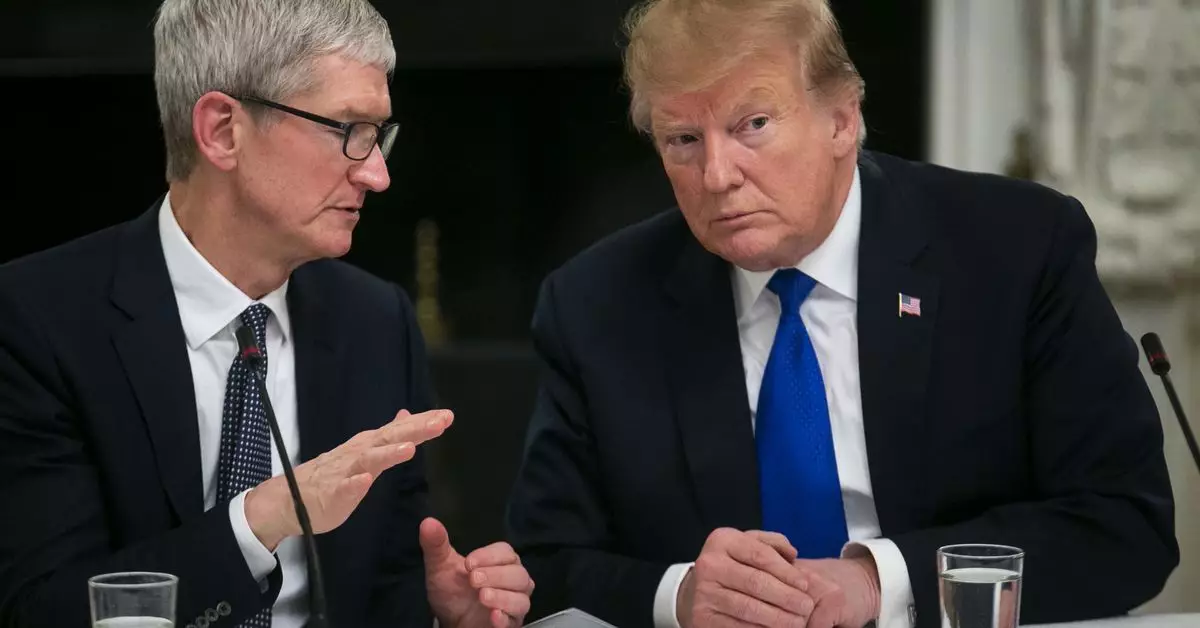In an intriguing development that underscores the intertwined fates of technology giants and politics, Tim Cook, the CEO of Apple, is set to dine with President-elect Donald Trump this Friday at his Mar-a-Lago resort in Florida. This meeting marks a significant milestone, as it will be Cook’s first encounter with Trump since the latter’s election victory. The dinner is pivotal given the evolving dynamics between the tech industry and the U.S. government, especially considering the importance of the tech sector to the American economy.
During Trump’s previous tenure, Cook cultivated a relationship that not only benefited Apple but also served as a template for other tech executives aspiring to negotiate pathways into the political arena. As Trump prepares for another four years, the stakes might be even higher. As such, Cook’s agenda likely includes strategic discussions on key issues that could profoundly impact Apple’s operations and future profitability.
One of the primary topics on Cook’s agenda will presumably be the potential tariffs that could reshape Apple’s business landscape. With a considerable amount of Apple’s products manufactured overseas, especially in China, any changes in trade policy could have significant ramifications for the company’s bottom line. The implications of these tariffs have been a lingering concern for many tech companies, prompting them to seek more proactive engagement with Washington.
Moreover, discussions about tariffs could lead to broader policy deliberations surrounding international trade agreements. The future of American manufacturing—particularly in the tech sector—could hinge on these discussions and the agreements that arise from them.
In addition to trade issues, Cook is anticipated to address scrutiny from the European Union regarding Apple’s business practices. Accusations of anticompetitive behavior—especially linked to App Store policies—have clouded Apple’s reputation in Europe. During the campaign, Trump famously posited that Cook reached out to him concerning substantial fines Apple faced, suggesting there’s a desire for a more favorable regulatory environment surrounding tech giants.
The conversation about regulatory frameworks could pave the way for a more collaborative relationship between tech firms and government entities. If Cook and Trump can find common ground in discussing these foreign pressures, it could greatly influence the approach the U.S. will take regarding the tech sector’s regulation under Trump’s administration.
This dinner invitation comes on the heels of a series of engagements between Trump and other tech leaders, including discussions with Sundar Pichai of Google and Amazon’s Jeff Bezos. These interactions underscore the growing trend of tech executives seeking engagement with political leaders to influence decision-making processes that affect their businesses.
With tech companies actively donating to Trump’s inauguration funds, it’s evident that they are keen on crafting a favorable business climate. This engagement plays an essential role in shaping policies that govern Silicon Valley and beyond, rendering the dialogue between executives and the presidency a critical element of modern governance.
Tim Cook’s dinner with Donald Trump not only symbolizes a renewed relationship but also opens the door for meaningful dialogue concerning tariffs, European regulations, and the broader technological landscape—all significant areas that stand to shape the future of not just Apple, but the tech industry as a whole.

